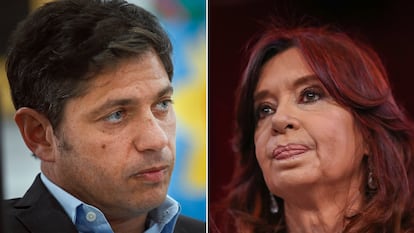The governor of Buenos Aires faces Cristina Kirchner's leadership in Peronism and launches his own space


Cristina Kirchner has been the leader of Peronism for the past 15 years. The politician who was twice president of Argentina retained the leadership of the movement even during the mandate of Alberto Fernández (2019-2023), whom she chose as the head of a ticket that had her as vice president . But since the harsh defeat suffered by Peronism in the 2023 presidential elections, her internal power is increasingly disputed. The latest to stand up to her is Axel Kicillof, the governor of the province of Buenos Aires, the largest, most populous and richest in Argentina. With the stripes of having been re-elected to office in the last election and the support of some heavyweights of the party, Kicillof seeks to force a renewal of Peronism that can confront Javier Milei.
Kirchner's former successor launched his own space this weekend, the Right to the Future Movement. "Peronism faces a historic challenge: to rebuild itself to lead an alternative to the experiment of adjustment and cruelty that the national government of Javier Milei is carrying out," begins the document with which the new space was announced, backed by 400 signatures, including from mayors, deputies, social movements and unions.
Kicillof, 53, holds the most powerful elected position in Argentina after the president , and wants to use it in negotiations ahead of the legislative elections in October. He calls for an understanding of the reasons for the 2023 electoral defeat, to recover the agenda and bring new ideas that represent workers, productive sectors, science, education and culture.
Politicians aligned with the governor of Buenos Aires are beginning to express in front of microphones what many Peronists have been thinking quietly for some time: discontent with the latest candidates proposed by Kirchner and rejection of her son, Máximo, in the leadership. Daniel Scioli, the man that the then president chose to succeed her in 2015, is now part of the Mileísta ranks as Secretary of Tourism, Sports and Environment; Alberto Fernández, her candidate in 2019, won the Presidency, but left power with his popularity on the floor and his image has deteriorated even further since he was denounced for alleged gender violence and corruption. Massa, the great internal rival whom she finally accepted as a candidate in 2023, led the biggest defeat of Peronism in recent history.
Buenos Aires leaders such as Mario Secco, mayor of Ensenada, say they do not want to break the space, but to have a say in the leadership of Peronism and in the formation of the electoral lists. “Being a verticalist is that they put Scioli in my place and I didn’t like him and I went with him. I didn’t like Alberto, nor did Massa, and I went with them. We are not disruptive,” said Secco on Monday, one of the politicians who were faithful allies of Kirchner, but have now changed sides. The governor’s supporters claim him as a shield against the chainsaw of the ultra leader and as an example of another way of governing.
Kicillof's announcement has come as a cold shower to the former president's entourage. They believe that the governor's move divides Peronism in practice. They also criticise the fact that he has chosen to contest the opposition leadership just when Milei's government is going through the worst political crisis of its mandate , triggered by the promotion of the cryptocurrency $Libra through social networks.
Kirchner presides this Monday over the Justicialist Party Council with the waters stirred up by Kicillof. The former president already saw her authority questioned months ago by a minor governor, the Riojan Ricardo Quintela , but she came out unscathed. The move by the man who was her last Minister of Economy poses a much bigger challenge. It will force her to negotiate or pay the price of a rupture in the electoral results.
The Argentine Congress has eliminated primary elections, forcing political parties to make their decisions in advance. Eight months before the elections, Kirchner still does not know whether the Senate will approve the Clean Record Law that would keep her out of the electoral race due to her conviction for corruption in the second instance . Polls show Milei's party, La Libertad Avanza, as the favorite, which is betting on governing the second half of the mandate strengthened in both legislative chambers. Any division of Peronism at the polls would further weaken the large opposition party.
EL PAÍS






